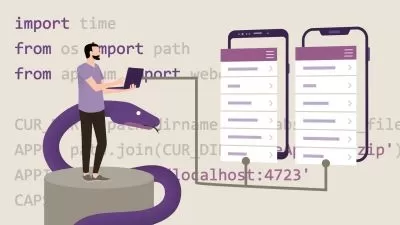Testing in Compose Multiplatform Environment (Android & iOS)
Stefan Jovanovic
1:32:29
Description
Concise and Straight-to-the-point Cross-Platform Testing in Compose Multiplatform for Android and iOS
What You'll Learn?
- UI Testing
- Android App Testing
- iOS App Testing
- Compose Multiplatform Testing
- How to write more testable code
- What is Testing and why it is important
- Using a common Testing API
- Verify UI components behaviour
- Testing the Navigation between screens
- Creating a Test Double
- Debugging and troubleshooting while testing
- Breaking the fear of Testing
Who is this for?
What You Need to Know?
More details
DescriptionIn today’s fast-paced world of app development, the ability to create and maintain applications across multiple platforms is crucial. With more businesses and developers seeking solutions that cater to both Android and iOS users, Compose Multiplatform has emerged as an incredible tool that allows us to write reusable code for both platforms while keeping the native feel intact.
However, as with any mobile app development, ensuring your application runs smoothly across platforms requires robust and efficient testing strategies. And that’s exactly what this course is all about.
Throughout this course, you’ll learn how to:
Set up a Compose Multiplatform testing environment for both Android and iOS.
Write and run unit tests, UI tests, and integration tests in a Compose Multiplatform project.
Utilize test automation tools for streamlining the testing process.
Debug and troubleshoot cross-platform issues that may arise during testing.
Implement effective test-driven development (TDD) practices across both Android and iOS projects.
Ensure code quality and maintainability through automated testing.
This course highlights the advantages of testing your Compose Multiplatform app, focusing on how to write code that is more testable for both Android and iOS. You’ll gain insights into creating reliable tests that ensure your app performs as expected on both platforms.
I’ve set up a project for you, ready to go, so you can dive straight into writing tests and verifying that your code works as intended. With Jetpack Compose, testing becomes significantly easier, helping you reduce the time spent on writing test cases while improving the quality of your app. We'll begin by covering the fundamentals of testing and discussing why it’s essential for delivering a high-quality project.
Next, I’ll introduce you to a simple two-screen app project that we’ll test together. As we go through it, I’ll explain the logic behind various design choices, all aimed at simplifying the testing process for you. From there, we’ll set up the necessary testing dependencies to get started.
Instead of using a real local database for testing, we’ll create a mock data source that replicates the behavior of our data source. This will give us full control over the data, allowing us to test in a controlled, isolated environment.
Our first focus will be testing the home screen. The goal will be to create test cases for every possible scenario, including loading states, successfully displaying data, and handling errors.
The second test will cover navigation between the two screens, simulating user input, button presses, and other UI interactions, while also testing how the app interacts with the data layer.
Ultimately, I’ll guide you through the process of making testing less intimidating and more enjoyable, showing how rewarding it can be when done right.
Who this course is for:
- Android Developers
- iOS Developers
- Mobile Developers
- Anyone who wants to learn how to test Compose Multiplatform app for both Android/iOS
- Anyone who wants to learn testing in general
In today’s fast-paced world of app development, the ability to create and maintain applications across multiple platforms is crucial. With more businesses and developers seeking solutions that cater to both Android and iOS users, Compose Multiplatform has emerged as an incredible tool that allows us to write reusable code for both platforms while keeping the native feel intact.
However, as with any mobile app development, ensuring your application runs smoothly across platforms requires robust and efficient testing strategies. And that’s exactly what this course is all about.
Throughout this course, you’ll learn how to:
Set up a Compose Multiplatform testing environment for both Android and iOS.
Write and run unit tests, UI tests, and integration tests in a Compose Multiplatform project.
Utilize test automation tools for streamlining the testing process.
Debug and troubleshoot cross-platform issues that may arise during testing.
Implement effective test-driven development (TDD) practices across both Android and iOS projects.
Ensure code quality and maintainability through automated testing.
This course highlights the advantages of testing your Compose Multiplatform app, focusing on how to write code that is more testable for both Android and iOS. You’ll gain insights into creating reliable tests that ensure your app performs as expected on both platforms.
I’ve set up a project for you, ready to go, so you can dive straight into writing tests and verifying that your code works as intended. With Jetpack Compose, testing becomes significantly easier, helping you reduce the time spent on writing test cases while improving the quality of your app. We'll begin by covering the fundamentals of testing and discussing why it’s essential for delivering a high-quality project.
Next, I’ll introduce you to a simple two-screen app project that we’ll test together. As we go through it, I’ll explain the logic behind various design choices, all aimed at simplifying the testing process for you. From there, we’ll set up the necessary testing dependencies to get started.
Instead of using a real local database for testing, we’ll create a mock data source that replicates the behavior of our data source. This will give us full control over the data, allowing us to test in a controlled, isolated environment.
Our first focus will be testing the home screen. The goal will be to create test cases for every possible scenario, including loading states, successfully displaying data, and handling errors.
The second test will cover navigation between the two screens, simulating user input, button presses, and other UI interactions, while also testing how the app interacts with the data layer.
Ultimately, I’ll guide you through the process of making testing less intimidating and more enjoyable, showing how rewarding it can be when done right.
Who this course is for:
- Android Developers
- iOS Developers
- Mobile Developers
- Anyone who wants to learn how to test Compose Multiplatform app for both Android/iOS
- Anyone who wants to learn testing in general
User Reviews
Rating
Stefan Jovanovic
Instructor's Courses
Udemy
View courses Udemy- language english
- Training sessions 9
- duration 1:32:29
- Release Date 2025/03/08











